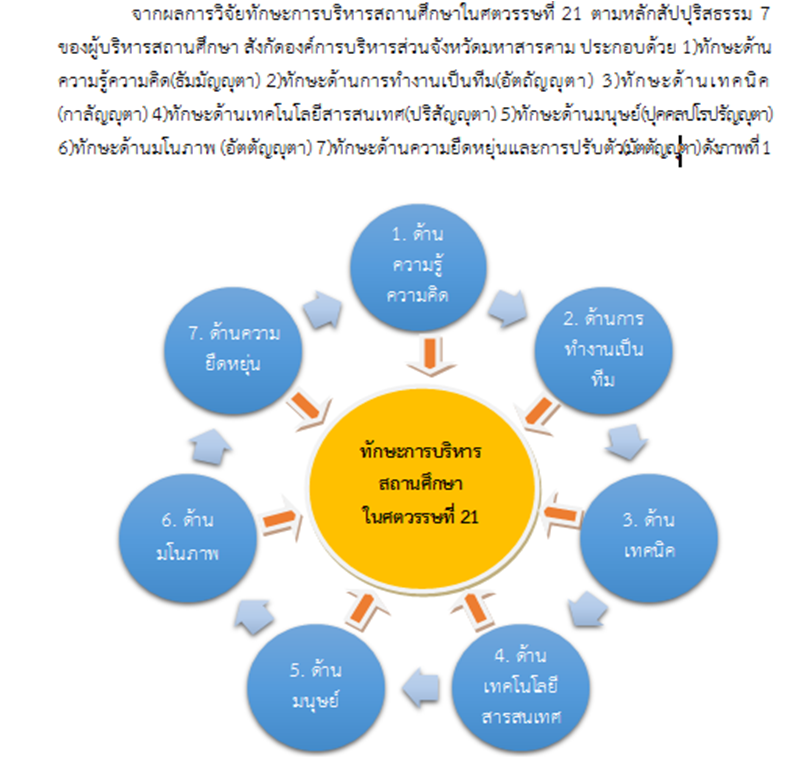THE 21st CENTURY EDUCATIONAL ADMINISTRATION SKILLS BASED ON THE SEVEN PRINCIPLES OF SAPPURISADHAMMA FOR ADMINISTRATORS OF THE SCHOOL UNDER PROVINCIAL ADMINISTRATIVE ORGANIZATIONS IN MAHASARAKHAM PROVINCE
Main Article Content
Abstract
The objective of the research article were 1) to study the administrative skills of educational institutions, 2) to compare the 21st century educational administration skills, 3) to study suggestions to the administrative skills of educational institutions in the 21st century educational administration skills, 4)to study development approach in the administrative skills of educational institutions in the 21st century educational administration skills based on the seven principles of Sappurisadhamma for administrators of the school under provincial administrative organizations in Mahasarakham province. The sample used in this research was personnel of 210 educational institutions in Mahasarakham provincial administrative organization. The tool used for data collection was a questionnaire and a semi-structured interview. The statistics used for data analysis were frequency, percentage, mean, standard deviation. Hypothesis was tested by independent samples t-test and one-way analysis of variance using F-test statistic.
The results of the research were as follows: 1.The administrative skills of educational institutions in the 21st century educational administration skills based on the seven principles of Sappurisadhamma for administrators of the school under provincial administrative organizations in Mahasarakham province by overall was at a high level. 2. The result of comparisons on the level of opinions towards the administrative skills of educational institutions in the 21st century educational administration skills based on the seven principles of Sappurisadhamma for administrators of the school under provincial administrative organizations in Mahasarakham province, classified by status, age, and work experience, the overall is no different. 3. The suggestions to the administrative skills of educational institutions in the 21st century educational administration skills based on the seven principles of Sappurisadhamma for administrators of the school under provincial administrative organizations in Mahasarakham province: the executives should have knowledge and proficiency in using knowledge, idea, wisdom, and vision in agency administration to be efficient and effective. There should be knowledge and understanding on the use of techniques and methods in managing the work to be systematically effective, be able to solve problems in the team and provide fairness among group members.
Article Details

This work is licensed under a Creative Commons Attribution-NonCommercial-NoDerivatives 4.0 International License.
References
บุญชม ศรีสะอาด. (2556). หลักการวิจัยเบื้องต้น. พิมพ์ครั้งที่ 9. กรุงเทพมหานคร : สุวิริยาสาส์น.
มณฑาทิพย์ นามนุ. (2561). ทักษะของผู้บริหารสถานศึกษาในศตวรรษที่ 21 สังกัดสำนักงานเขตพื้นที่การการศึกษาประถมศึกษาปทุมธานี เขต 2. วิทยานิพนธ์ปริญญาศึกษาศาสตรมหาบัณฑิต สาขาวิชาการบริหารการศึกษา. มหาวิทยาลัยเทคโนโลยีราชมงคลธัญบุรี.
รสสุคนธ์ มกรมณี. (2555). บทบาทผู้บริหารสถานศึกษายุคไร้พรมแดนในบริหารการศึกษาสู่คุณภาพสากล. กรุงเทพมหานคร : พลัส พลัส ครีเอเทอร์.
ศศิตา เพลินจิต. (2558). ทักษะการบริหารในศตวรรษที่ 21 ของผู้บริหารสถานศึกษาขั้นพื้นฐาน สังกัดสำนักงานเขตพื้นที่การศึกษาประถมศึกษานครปฐม เขต 1. การค้นคว้าอิสระหลักสูตรครุศาสตรมหาบัณฑิต สาขาวิชาการบริหารการศึกษา. มหาวิทยาลัยราชภัฏกาญจนบุรี.
สำนักงานเลขาธิการสภาการศึกษา. (2557). รายงานการวิจัยแนวทางการพัฒนาการศึกษาไทยกับการเตรียมความพร้อมศตวรรษที่ 21. กรุงเทพมหานคร : สำนักงานเลขาธิการสภาการศึกษา.
R. V. Krejcie, & D. W. Morgan. (1970). Determining Sample Size for Research Activities. Educational and Psychological Measurement. 30(3). 607-610.


